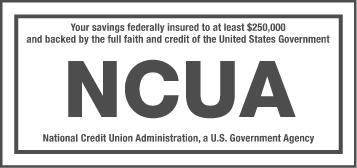Deceased Member Road Map
Dealing with the loss of a loved one can be a difficult and stressful time for you and your family. This resource provides information that may be helpful in handling your loved one's estate.
This guide provides a general overview and is not meant to address all aspects of the account settlement process and is not intended as legal or tax advice. We recommend consulting with a legal or tax professional to confirm requirements specifically applicable to your loved one's estate and other assets.
Account Ownership
- Individual Accounts:
Accounts without a co-owner or a designated beneficiary. To close the account, we would need a Death Certificate and a court-issued document appointing an executor/administrator or small estate affidavit in accordance with state laws. - Joint Accounts:
Accounts owned by more than one person. Joint accounts at SRP FCU are established with right of survivorship, which means if one or more of the multiple party owners dies, his or her interest in the account passes to the remaining owners; unless subject to our right of set-off or a pledge of the funds in the account(s), in which case all sums in the account(s) will belong to us regardless of contributions, up to the amount of the obligation(s) owed. The surviving joint owner(s) can continue to use the account while the estate is being settled.- Note: We will eventually need to close the deceased owner's membership. However, the joint owner does have the option to move the existing checking account to their own membership.
- Co-Borrower Accounts:
Like joint accounts, co-borrowers on credit or lending products share equal responsibility for the debt. Upon the death of one borrower, the surviving borrower(s) continue to have responsibility for repayment.- Note: Authorized users are not the same as co-borrowers. An authorized user has permission to use an open credit product during the lifetime of the account owner; that right ends when the account owner passes away.
- Safe Deposit Box:
If there is a surviving lessee, he or she will continue to have access to the box until the box is closed. If the box did not have any joint lessee, we would need court documents naming someone as estate representative. If the lessee or representative do not have a key, there may be a drilling fee. - Power of Attorney:
A Power of Attorney designating another to act on behalf of the account owner (the Principal) is valid only during the account owner's lifetime; the power to act ends with the account owner's death.
*These materials are for informational purposes only and not to be construed as legal or tax advice. Please consult with your own legal or tax advisor directly concerning your specific circumstances.
Frequently Asked Questions (FAQs)
What will SRP need to close the accounts?
- Certified copy of the Death Certificate - The death certificate gives us the information needed to verify the identity and legal residence of our member. We will make a copy and return the original.
- Personal Representative Paperwork or Letters of Testamentary - If there is no joint owner or beneficiary on the shares, SRP FCU will require Personal Representative paperwork or letters of Testamentary. These documents are issued by the court and name a representative who will manage the assets and liabilities of the estate. For Small Probate: a properly executed Small Estate affidavit or court order, in accordance with state laws. We will make a copy and return the original.
How will outstanding loans/credit card balances be handled?
- If the member has Credit Life Insurance on his/her loan, SRP will file the Credit Life Claim with Minnesota Life Insurance Company.
- If there is no joint owner on the share accounts, the available funds in the share are immediately transferred to the balance of any open loan.
- If the share account has a joint owner, the funds in the account are placed on hold to determine where the funds in the share were derived from. Our Recovery Department will reach out to the joint owner or person who has an interest in the property to determine their intentions.
- If there is an outstanding balance on an unsecured debt, a claim will be filed in the approriate Probate Court.
- If SRP is unable to contact anyone and no payments are made on the loan, the collateral would go out for repossession.
To contact our Recovery Department please call 1-800-237-9829 ext.4393.
How long can the membership stay opened?
We recommend that you settle your loved one's accounts within a year of their passing. SRP FCU will continue reporting to the Internal Revenue Service (IRS) under the deceased member's Social Security Number (SSN) until the accounts are closed.
What will happen to direct deposits coming to SRP FCU?
If a direct deposit is received from one of the federal paying agencies (such as the Veterans Administration or Social Security Administration) on or after the member's date of death, SRP is required to return the funds.
If I am a joint owner will I still have access to online banking?
Yes, as long as you are joint on all the shares and loans under the deceased owner's membership.
If I am a joint owner on the account and have my own ATM/Debit Card, can I still use the cards to access the account?
Yes, if you are a joint owner on the account your cards will remain active. We will automatically cancel the deceased owner's card once we are notified of their passing.
If I am the designated personal representative of the Estate, but I am not a joint owner on the deceased's account; will I be able to access information on the account, such as balances or cleared checks, etc.
Yes. Once you provide a certified copy of the probate documentation naming you as the personal representative of the Estate, you will be entitled to all account information.
How will certificates be handled?
The disbursement of funds from a certificate varies based on ownership. If the certificate has an individual owner (no joints), the funds will be disbursed to the deceased's estate or beneficiary. If the certificate has a joint owner, the surviving joint may choose one of the following options:
- Transfer the certificate funds into a certificate under their membership, keeping the same dividend rate and maturity date as the original.
- Cash in the certificate without penalty.
Does SRP offer Estate Accounts?
Yes, if the decedent had an open/active membership at the time of death. To establish an Estate account, we would need the death certificate, personal representative documents and the EIN confirmation document from the IRS.
How do I notify SRP of a member's passing?
You can visit any one of our branch locations, call our contact center at 1-800-237-9829, or you can mail the documents to:
SRP Federal Credit Union
Attn: Deposit Services PO Box 6730
North Augusta, SC 29861
*These materials are for informational purposes only and not to be construed as legal or tax advice. Please consult with your own legal or tax advisor directly concerning your specific circumstances.*
Useful Terms & Definitions
- Beneficiary:
The person or persons who receive the assets of an estate after all debts are satisfied. - Certified Copy of the Death Certificate:
A copy of the death certificate that has been certified; typically, this document has a seal stating, "This is a true and certified copy." - Estate:
The assets and liabilities left by the decedent. - Executor/Executrix:
Person or corporation named in the decedents to settle the estate and approved by the court to serve as such. - Fiduciary:
A person entrusted with the responsibility to manage the assets or rights of another person. May also be referred to as a Guardian, Conservator, Executor, or Administrator, Trustee, Rep Payee, or Custodian. - Letters of Testamentary:
Court documents obtained by the executor/trix confirming his or her appointment as the personal representative with authority to settle the estate. - Payable Upon Death (POD):
An account with a beneficiary designated by the account owner. The surviving beneficiary(ies) will receive the assets of an estate after all debts are satisfied. - Probate:
The process of gathering a decedent's assets, paying the creditors and any taxes owed, then distributing the remainder according to the will or state law. - Trust:
A legal arrangement involving three parties: the party creating the trust (Grantor), the party administering the property within the trust (Trustee), and the party for whom the trust is administered (beneficiary). - Will:
A legal document in which a person includes instructions for the distribution of his or her property and possessions after death.
*These materials are for informational purposes only and not to be construed as legal or tax advice. Please consult with your own legal or tax advisor directly concerning your specific circumstances.*




